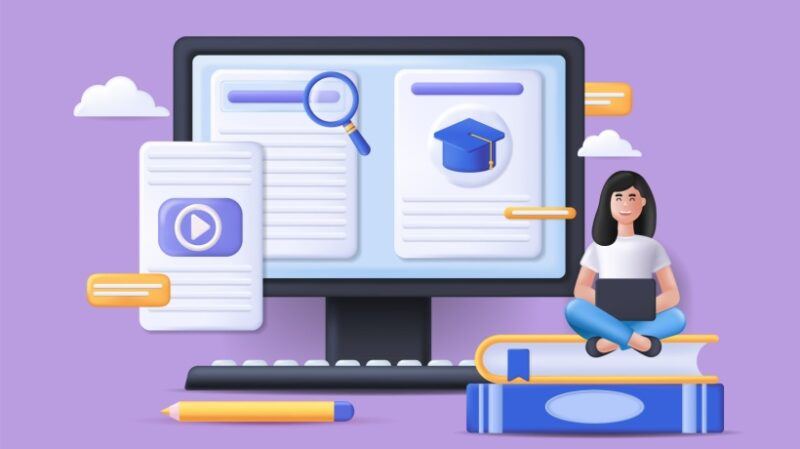
Crafting Meaningful Learning Experiences
The landscape of higher education has undergone a significant transformation in recent years, with online learning becoming an increasingly popular choice among adults. Recent publications, including “What do higher education students want from online learning?” (2023) [1] or “Shaping the Future of Online Learning” (2024) [2], have highlighted the need for improvements in several key areas to enhance the quality and effectiveness of online education. While academics bring essential expertise and deep knowledge of their content areas, transitioning to online learning environments can be challenging. The role of learning designers is to help by offering specialized skills to optimize students’ learning experiences.
A Common Misconception About Learning Designers
Learning designers are sometimes seen as tech-savvy professionals who manage the technical aspects of course delivery, such as uploading materials to platforms, video editing, or even coding. This perspective is understandable given the prominent role that digital technology plays in online learning; however, this perception can prevent academics from fully utilizing their expertise.
Learning designers are educational specialists with expertise in adult learning within online environments. Their primary focus is planning, designing, and strategically using educational technology to support teaching and learning.
Understanding The Role Of Learning Designers
Learning designers recognize that different modes of delivering education require distinct approaches. While the foundational principles of learning are consistent across face-to-face and online contexts, directly replicating in-person methods online doesn’t work. Classrooms benefit from face-to-face interactions, spontaneous discussions, and nonverbal cues; without these, online environments rely on technology to mediate all interactions. This shift requires tailored strategies to engage students, maintain motivation, and ensure accessibility and success for all learners, regardless of background or ability.
Learning designers can play a pivotal role in this process. They are skilled at tailoring the learning experience to adult learners’ unique needs, challenges, and motivations. They can also effectively combine pedagogy and technology to support desired learning outcomes.
Technology Meets Pedagogy
Learning designers typically work across different academic subjects but are not Subject Matter Experts. Instead, they partner with academics to translate their expertise into engaging online courses. The practice of learning designers is guided by their knowledge of digital tools and grounded in research and principles from education, educational technology, and cognitive psychology,
Digital technology presents a wealth of opportunities for engagement, enabling learners to navigate through material and consume content flexibly. One of the critical strengths of many online teaching platforms, for example, is their ability to support a learner-centered approach [3]. These platforms allow instructional strategies that combine passive and active learning (retrieving practices, enquiry, or collaboration). This integrated approach (i.e., reading, watching videos, contributing to discussions, reflecting) is linked to improved educational outcomes and a more engaging learning experience.
Learning designers are experts in intentional engagement. They craft every element of the online course to ensure learners remain actively involved and focused. While digital technology provides the tools, the learning designer’s expertise in crafting the teaching and learning activities meaningfully drives learners’ engagement.
Designing For Synchronous And Asynchronous Learning
When designing online courses with synchronous and asynchronous components, learning designers focus on seamless integration to keep learners engaged. Adult learners typically seek flexibility, which the flipped classroom model can provide. Digital tools allow learners to complete self-paced activities, such as prerecorded lectures, readings, and discussions, and interact with tutors and peers in live sessions.
While digital tools offer valuable opportunities for asynchronous and real-time interaction, expecting students to engage without adequate direction, communication, and preparation can be counterproductive. Learning designers play a crucial role in mitigating the challenges learners often face in online environments, such as feeling overwhelmed, grappling with complex concepts, lacking prerequisite knowledge, or uncertainty about expectations.
By thoughtfully crafting the asynchronous components of the course, learning designers provide learners with the resources and support they need to arrive at the live sessions well-prepared and confident in their ability to participate actively and meaningfully. This, in turn, allows academics to focus on facilitating engaging discussions and moderating activities during the live sessions, leveraging their subject matter expertise within a supportive online environment.
Learning Design Is A Collaborative Endeavor
A high-quality online course requires careful planning and design that considers every aspect of the learner’s journey, which is why learning designers collaborate with other experts. They partner with academics to translate their expertise into engaging content and ensure learning outcomes are met. They work closely with learning technologists to select and implement digital tools, providing a seamless technical experience for staff and students. They liaise with multimedia developers and graphic designers when the course requires the production of assets such as video, animations, or interactive simulations. This multifaceted approach ensures that online courses are relevant, pedagogically sound, technically robust, accessible, and aesthetically appealing.
References:
[1] What do higher education students want from online learning?